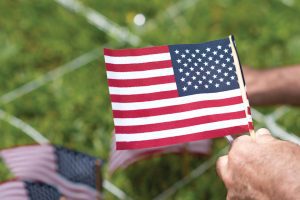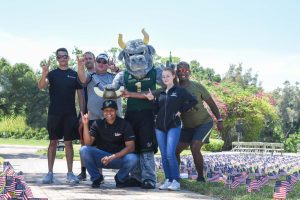veteran volunteers
Research looks at the role of community engagement in helping returning vets
Eric Hodges, PhD, is searching for an effective way to integrate returning veterans into civilian society. Combining preliminary research findings with his own experiences as a Marine, he’s proposing that civic engagement — everything from mentoring at-risk youth to volunteering at disaster sites — could benefit returning vets and American society at large.
Hodges, an assistant professor of interdisciplinary social sciences and political science at USF Sarasota-Manatee, began his research while working on his doctorate at Virginia Tech, where he encountered the groundbreaking work of sociologist Robert Putnam. Putnam observed that Americans were spending time by themselves instead of interacting with friends and neighbors, joining clubs or participating in civic organizations — a phenomenon that has led to the disintegration of our communities, social fabric, even democracy itself.
By contrast, Hodges noted that vets returning from Iraq and Afghanistan were volunteering for community service in record numbers.
"If my research finds that community engagement helps veterans reintegrate, then maybe there are changes that can be made."
“Vets were actively trying to seek out and rebuild the community and sense of purpose they lost when they got out [of the military],” he said. “That led me to examine the role that civic engagement can play in helping them reintegrate when they come home.”
Building on his idea, Hodges formulated what became a long-range project titled “Soldier to Citizen: How Military Culture Encourages Civic Engagement Among Veterans.” Hodges designed interviews that would gauge the level of civic engagement among Marine Corps recruits and drill instructors. He’s still in the initial phase of research, but preliminary findings show that
Marine Corps training develops leadership skills and community-oriented values. Later phases will involve the development of a survey instrument and quantitative analysis of that data using statistical coding techniques, refinement of the hypothesis and major data collection. Hodges also is doing a needs assessment of veterans and their families who reside in Manatee County and investigating the civic engagement of “military brats.”
According to prevailing social science literature, a person needs three things to become civically engaged: skills, desire and opportunity. Hodges’ research indicates that Marine Corps training provides the skills and desire. He’s hoping that his research can provide the opportunity.
“If my research finds that community engagement helps veterans reintegrate, then maybe there are changes that can be made at the local, state or federal level,” he explained. “I’m not directly trying to influence policy, but once I find accurate information, I think it should be shared with policymakers to inform their process.”
There are already a number of veteran-sponsored organizations that match vets with volunteer opportunities. By connecting with policymakers, perhaps Hodges can stimulate the creation of public-private partnerships to further invigorate community engagement among vets to the benefit of service people, civilians and American democracy.





